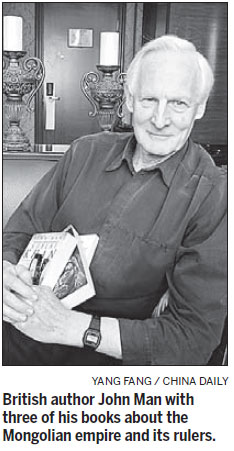Marco Polo first introduced Kublai Khan and his empire to the West in the 13th century, whilemore recently a British author has devoted himself to the exploration of Mongolian history andculture for the past two decades.
John Man, a historian and travel writer, has written three books about the Mongol empire: TheLeadership Secrets of Genghis Khan, Genghis Khan: Life, Death and Resurrection, and KublaiKhan: The Mongol King Who Remade China, and his books have been translated into 20languages.
"Genghis is a big name, internationally," the author saysat the China Grassland Culture Forum in Hohhot, inJanuary. It was Man's second appearance at the forum,which features experts from home and abroad.
"I wanted to go somewhere far away," says Man, whostarted studying Mongolian culture at university. "And atthe time I thought Mongolia was a very remote country."
In response he studied Mongolian for a year in Londonand signed up for an expedition, which was canceled atthe last moment. "So it became an unfulfilled dream forme."
Man became a journalist and a writer after graduation,but in the early 1990s, when his publisher asked him if hehad any ideas for his next book, the idea of going toMongolia came to him.
He published his first book about Mongolia, Gobi:Tracking the Desert, in 1997. But he realized that the realkey to the Mongol empire was Genghis Khan and hedetermined to do further research on the historic figure.
"One of the ways to research Genghis Khan is to go towhere he is buried. And the other is to find out how hedied."
Man believes Genghis Khan died in a remote valley inChina and he has been there twice.
"It is very hard to get to, but not too high to climb. A lot of Mongolians go there."
He failed the first time but succeeded the second time, making him one of the few Westernersto explore the valley.
He says it is important to preserve the Mongolian grasslands, calling them among the mostimportant landforms on Earth.
He adds that the influence of traditional Mongolian culture is declining as its people adapt tomodern lifestyles.
Herdsmen send their children to the major cities to become better educated, but the result isthat they don't use or pass on the Mongolian language, can't ride horses, perform khoomei(throat singing), or play the matouqin (horse-head stringed instrument).
Man suggests young Mongolian people should return to the grasslands and their traditionalculture.
"Everything is changing fast. It is vital for us to preserve these cultures," he says.
yangfang@chinadaily.com.cn
(China Daily 02/25/2013 page20)



No comments:
Post a Comment